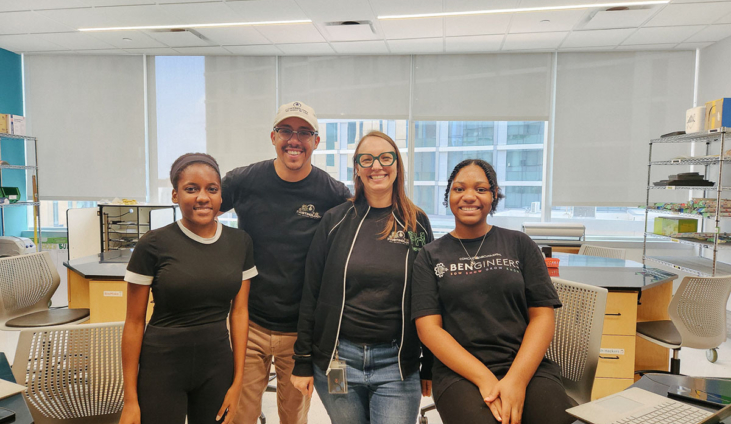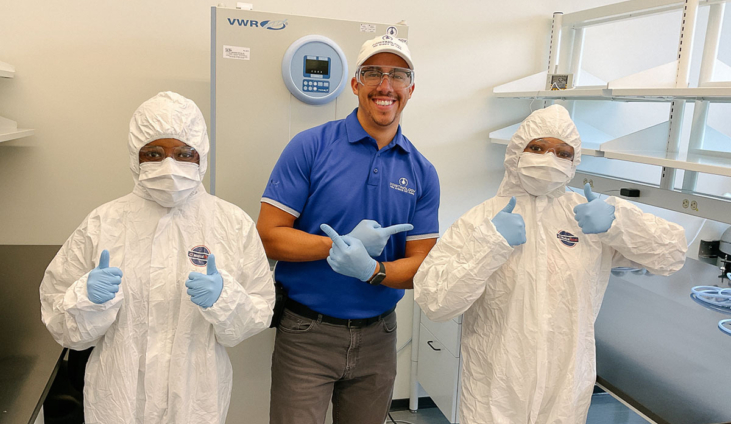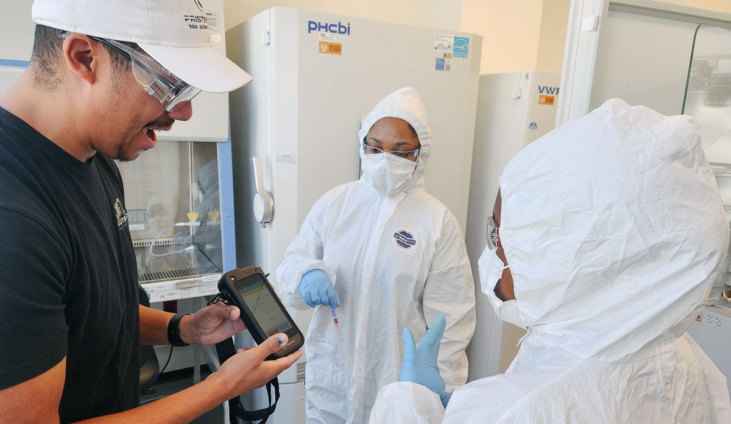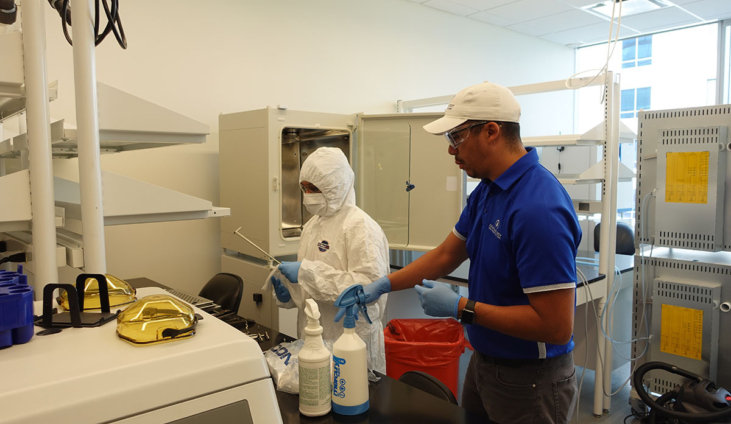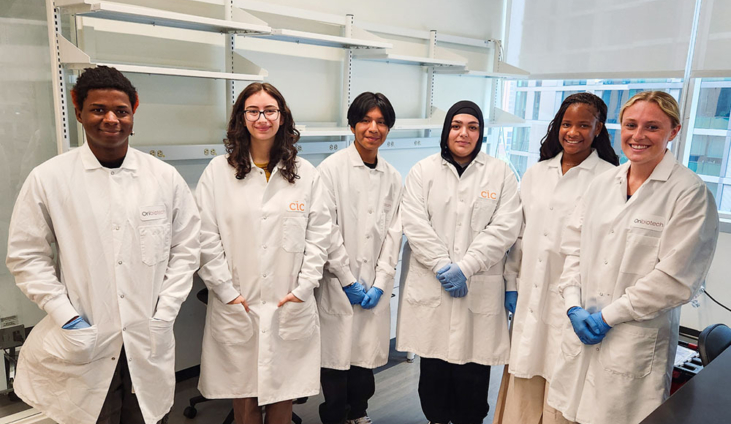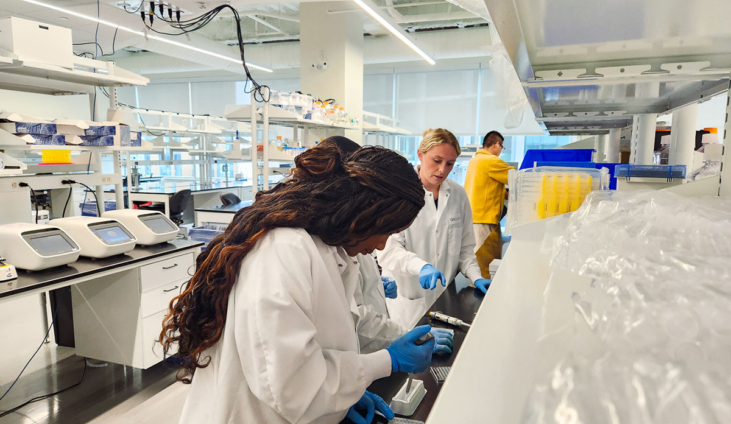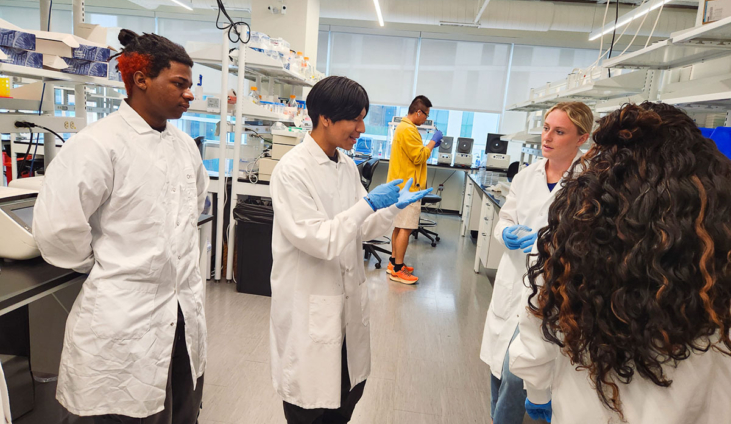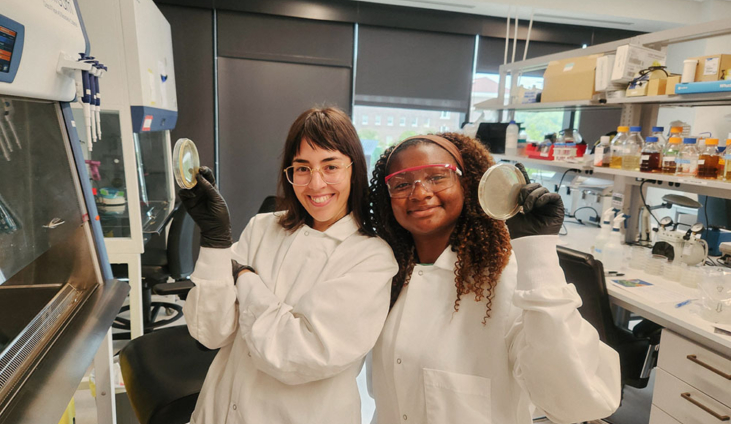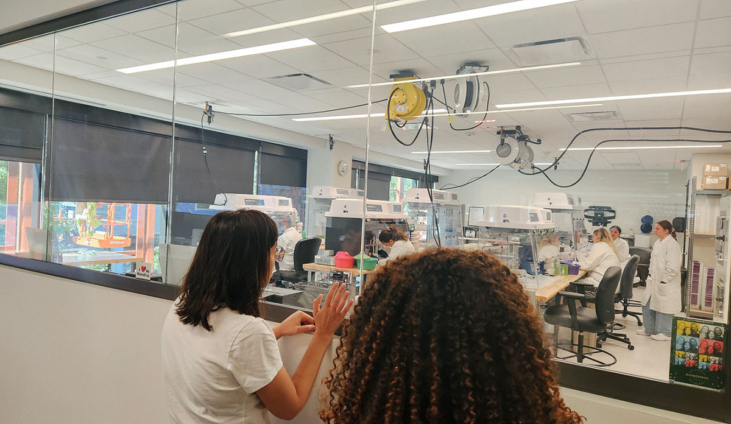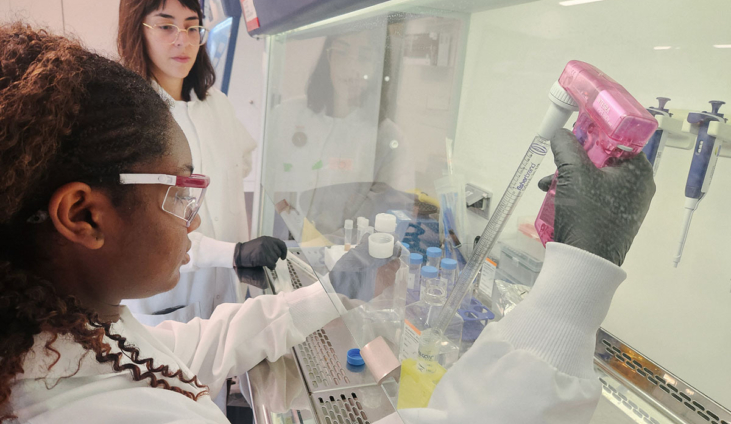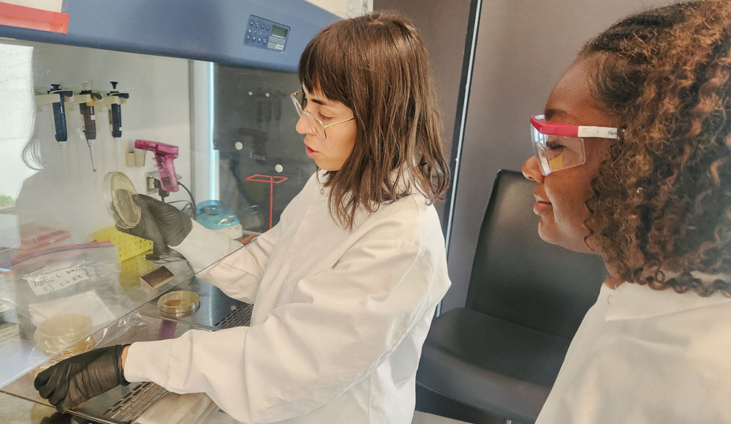However, internships in the U.S. have become increasingly competitive as fewer companies open their doors to entry-level hires. The impact of shrinking opportunities can be especially hard for marginalized students, who may not have the existing networks and resources to locate and apply to these hard-to-find positions.
The Science Center is making use of its extensive network to create viable internship opportunities for FirstHand™ students, thanks to participation from several mentor companies that routinely engage with the program. This summer saw the launch of three different micro-internships: Pristinology, Ori Biotech, and bioMérieux.
To be eligible to apply for one of the one-week internships, students must have completed FirstHand’s Biotechnology Sprint. Seven interns across the three internships received a paid stipend for their work and valuable one-on-one instruction from life science mentors. Here’s what they learned.
"And through this experience, I know this is for sure a career path I want to pursue.
Pristinology: Lessons in Clearing a Path
Pristinology is the first Latino-owned scientific decontamination company in Philadelphia. They specialize in minimizing laboratory contaminations so that people can focus on what matters most: the science.
Lab cleanliness is an essential part of successful scientific research. Without a clean lab, contamination can potentially derail months – or even years – of research. Students participating in the internship got to see a side of science that is not always shown, despite its essential role in research.
Two interns learned lab safety as well as intense decontamination procedures, following specific protocol for cleaning incubators. At first they were observing, then cleaning with assistance – but by the end they were expected to do the cleaning protocol by themselves.
“Day 1, hands were sweaty; the students were a little nervous. Tamika, I could tell she was on the nervous side and I told her, I’m happy that you’re nervous because you’re on the right path. You have to be challenged. By the time you get through this, you’re not going to feel nervous anymore,” explained Pristinology Founder and CEO Manny Ortiz.
Tamika agreed. “At the beginning I was really doubting if I could remember all the stuff that he was showing us how to do and be able to apply it, and by the end of it I was really confident – especially after he did a scan-over to see how we did, and we both did really well.”
For Manny, the internship is more than just a lesson in decontamination: it’s a window into the possibilities available for kids like himself. Growing up in North Philly, Manny knows the realities of under-resourced communities and the impact that access can make.
“The internship is an opportunity to show them what’s possible, and show them that people like us belong in this industry, and there’s a seat at that table – always,” he said. “We belong in all those rooms that everyone else is in.”
Tamika is a current college student taking a semester off to explore her options – and for her, the internship was a crucial step in her search for the right path forward. “I’ve always been interested in science,” she explained. “By the time I was in my senior year of high school, I knew I wanted to work in a lab in some sort of way. And through this experience, I know this is for sure a career path I want to pursue.”
Manny noted that when he talks to high school students, the same handful of careers in the life sciences always get mentioned. He hopes that the internship gives students the opportunity to see that careers in the life science industry are incredibly diverse and not limited to doctor, nurse, dentist, and teacher.
“The goal here was to teach them what most scientists never get to experience – and also teach them that there’s so much more to science beyond what we see on TV and in entry level jobs. There’s someone behind that curtain that’s pulling the strings to make it safe for everyone in the industry to do what they do,” he noted. And although lab safety should be an essential skill for lab scientists, studies have found that laboratory contamination – even when dealing with highly infectious specimens – is worryingly common.
“I’ve learned that there are a lot of people in the industry right now who don’t know half the stuff we learned while doing this internship,” said Tamika. “And it could definitely give people a step up in the game to experience this.”
She plans on staying in touch with Manny for networking opportunities and potential job connections going forward: unlike many life science employers that require students to complete degrees first, Manny is open to hiring internship students.
Students Go with the Flow (Cytometry) at Ori Biotech
Ori Biotech is a London and Philadelphia-based leader in cell and gene therapy manufacturing – and conveniently, they’re located just at 3675 Market Street in uCity Square alongside the Science Center and its FirstHand Lab.
The Ori Biotech internship students worked on flow cytometry, which is a lab test that uses lasers to measure cells and particles in a suspended solution. It’s an important tool for understanding cell populations and functions, making it widely used in research, diagnostics, and drug development. Students participating in this internship learned how to collect the cells, count them, stain them, acquire data on the flow cytometer, and then analyze the data.
“The goal is exposure: they’re not going to master flow cytometry in two days,” explains FirstHand Program Facilitator Andrea Poulsen. “They get to have lunch with the mentors, ask them questions about college, and most of the students are interested in biology or health. It’s a short, targeted experience.”
A key part of FirstHand internships is the extended time with mentors.
“We showed them a day in the life of what it’s like to be a scientist, what we do and how we do it, and why it’s important,” explained Ori Biotech mentor Amanda Benson. “I think this type of exposure can help show them what kind of careers are out there.”
In a typical FirstHand Sprint like Health Sciences, students are part of a class – meaning that opportunity for one-on-one questions are limited. During the internship, however, students can dive deep into what it means to be a scientist – and explore their interests more freely. “We were able to get into more detail since we were with a smaller group,” noted Amanda. “So the students had more freedom to ask questions for both what we were doing and things like talking about college and career growth.”
Not surprisingly, students are often overwhelmed by the reality of having to choose their career paths before having much experience in the working world.
“I feel like our mentor really showed me that there’s different sides of science, and that was really helpful for narrowing the things I want to do,” said Brian, an intern from Kensington CAPA High School. “She introduced me to a career that I probably will be thinking about after I finish my undergrad.”
An added benefit of the internship: some of the FirstHand mentors, such as those at Ori Biotech, are often in the early stages of their careers, allowing students to see themselves in these environments more easily. For young students – who may be the first in their family to attend college – having a relatable mentor can open their eyes to what is possible.
“It surprised me how young the mentors were. It was a good thing because it showed us how similar they were to us, that made it an even better experience because I could see myself being like them,” explained Brian. “They showed us that they were human – they were just really outgoing, and it felt like they were seniors and we were freshman.”
Not every internship student will end up pursuing a career in science. But by participating in the internship, they see that science is somewhere they could belong.
“I was happy to see that the students were excited and interested in what we were doing,” observed Amanda.
Lactic Acid Detection with bioMérieux
Next, FirstHand traveled down to the Navy Yard, where bioMerieux’s new, 3,000 sq. foot facility, is located. bioMérieux is a longtime partner of the Science Center, providing mentoring and on-site job shadow opportunities for FirstHand students.
This time, students were exposed to the consumer protections side of microbiology – testing food and beverages for microorganisms, ensuring both safety and quality.
The students used the company’s R&D kit to test for lactic acid in beer, which indicates the presence of lactobacillus brevis bacteria – one of the most important strains to test for because it will make beer taste sour. Beer manufacturers need to test their brews to make sure they’re free from this bacteria.
As part of the experiment, students went through the entire process of the kit and the sample preparation to see how much lactic acid they could detect – they also did a full DNA extraction of the microorganism.
The goal of the internship was to have a broad view of what molecular diagnostics is, and how PCR (Polymerase Chain Reaction, a laboratory technique) can be applied to the food industry space.
“This is an essential skill for anybody that works in any kind of space where at some point they have to deal with bacteria or yeast,” explained BioMérieux mentor Estefanía Novoa Rama. She was pleased to discover that her intern was not only excited about the opportunity, but ready to dive in. “I went through that process with Lael a bunch of times, and she was not only able to grasp the concepts, but she was able to apply them and really understand the math behind it, which was super cool to see.”
Lael, for her part, credited Estefanía with helping to ease her into the experience. “I thought that I’d be more overwhelmed, but my mentor Estefi really walked me through the steps and helped me through it,” she explained.
When it comes to preparing for her future, Lael isn’t playing around: she wanted to be an orthodontist, and applied for the bioMérieux internship so she could familiarize herself with the type of lab procedures she’d be doing in college. Intriguingly, a conversation with BioMérieux employees helped her realize there were multiple career options available to her within the field of dentistry.
“My main track is to be an orthodontist, that’s my dream; but now I know that there are other aspects of dentistry, I could do research and development and work in the lab, with medical things in the mouth and bacteria in the mouth, and I wouldn’t have known about that if I didn’t do this internship,” Lael explained.
When it comes to the internship experience, Estefanía is enthusiastic about exposing kids to real-world science early on.
“I did not get exposed to real-world applications of science until much later, like in college. And it was only through those experiences that I found what it would mean to be a scientist,” she explained. “With her coming to the site, she can see not only just people like me doing science, but she sees everything that goes into a scientific company. So it’s great exposure to see different career paths that this kind of work can lead to. Seeing yourself there, and not thinking that this is an impossible goal, is key.”
For student participants, the FirstHand internships shine a light on the reality that there are many diverse jobs available in the life science industry – and that if one role isn’t a good fit, another one might be.
Finding Their Footing in Science
“I knew this was something that was going to be way out of my comfort zone, and I’m so glad I went through with it,” said Tamika. “Even if you know something will scare you a little bit, it’s good to do things that you know are going to scare you.”
As many working professionals can attest to, career paths are rarely linear. To uncover the right path for them, students may need to explore numerous possibilities for their future. In this regard, the FirstHand internships have been a success – and the team hopes to continue the program next year, allowing more students to test the waters of what it means to be a scientist.
Manny summarized the internship:
“Seeing that lightbulb turn on when talking to these kids, exposing them to the life sciences, seeing that ‘aha’ moment: for me, it’s everything.”

